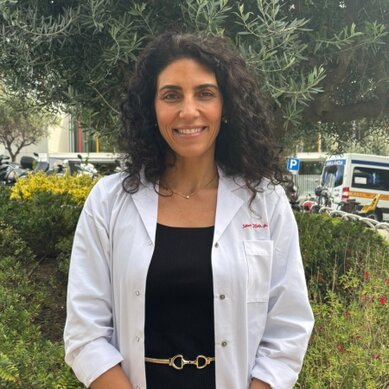
Georgia Sarquella Brugada
Jefe de Grupo
Research group
Research line:
Pediatric arrhythmias, genetic cardiology and sudden death
Georgia Sarquella-Brugada graduated in Medicine in 2001 from the University of Barcelona and obtained her Doctor of Medicine degree from the University of Barcelona in 2015. She has a master's degree in pediatric cardiology from the University of Barcelona, a pediatric electrophysiology master's degree from the University of Alcalà; and postgraduate degree in Medical Genetics from the University of Valencia and Familial Heart Diseases from the Menéndez Pelayo University.
Between 2007 and 2009 she did a fellowship at the Hôspital Sainte Justine in Montréal, Canada and from 2009 to 2011 at the necker Enfants Malades in Paris.
Since 2012 she has been a professor at the University of Girona and coordinator of the European Network of Rare Cardiac Diseases in Pediatrics.
In 2011 she joined the Cardiology service as an assistant and since 2015 she has been Head of the Arrhythmia Unit at Hospital Sant Joan de Déu.
She currently leads the research group on pediatric arrhythmias, genetic cardiology and sudden death and how to apply this knowledge in personalized therapies in patients with genetic diseases.
Last Publications
- Grassi S, Campuzano O, Ferri E, Leone G, Rossi R, Ortega-Sánchez M, Barberia E, Landin I, Arena V, Sarquella-Brugada G, Brugada R and Oliva A Forensic pathological and genetic landmarks in sudden cardiac death in the young: An update. FORENSIC SCIENCE INTERNATIONAL-GENETICS . 80: 103334-103334.
- Monda E, Biagini E, Blom N, Drago F, Krapels I, Krebsová A, Koubsky K, Khraiche D, Martins E, Merlo M, Michels M, Mizia-Stec K, Mörner S, Peña Peña ML, Planinc I, Robyns T, Rydberg A, Saenen J, Rodríguez Palomares JF, Rutger H, Sarquella-Brugada G, Scheirlynck E, Schulze-Bahr E, Tfelt-Hansen J, Wolf CM, Hofman N, Amin AS, Wilde A, Charron P and Limongelli G Current management of transition and multidisciplinary care of patients with inherited and rare cardiomyopathies in Europe: results of the European Reference Network for rare and low prevalence complex diseases of the heart. EUROPEAN HEART JOURNAL-QUALITY OF CARE AND CLINICAL OUTCOMES . 11(7): 1155-1163.
- Bergonti M, Sacher F, Belhassen B, Sarquella-Brugada G, Arbelo E, Sabbag A, Crotti L, Tfelt-Hansen J, Faccenda D, Casella M, Letsas KP, Rossi A, Schwartz PJ, Monaco C, Scheirlynck E, Pannone L, Russo V, Calò L, Caputo ML, Berne P, Vicentini A, Oezkartal T, Migliore F, Conti S, Compagnucci P, Scrocco C, Brugada P, de Asmundis C, Tondo C, Brugada-Terradellas J, Probst V, Behr ER and Conte G The Clinical Significance of Atrial Fibrillation in Non-High-Risk Brugada Syndrome: The BruFib Study. JACC-CLINICAL ELECTROPHYSIOLOGY . 11(11): 2471-2480.
Projects
- Project name:
- Cardiac characterization of children with TDD: Understanding the Inter-Crisis period (ICCC-TDD)
- Leader
- Georgia Sarquella Brugada
- Funding entities:
- Fundació Privada per a la Recerca i la Docència Sant Joan de Déu - FSJD, Martínez Barrios, Estefanía, TANGO02 Research Foundation
- Code
- TANGO2-v1
- Starting - finishing date:
- 2025 - 2026
- Project name:
- Monitorització remota cardíaca de pacients pediàtrics. Impacte social, mediambiental i de salut.
- Leader
- Georgia Sarquella Brugada
- Funding entities:
- ÁREA METROPOLITANA DE BARCELONA (AMB)
- Code
- 900623
- Starting - finishing date:
- 2023 - 2024
- Project name:
- Creación de un programa personalizado de actividad física dirigida para deportistas de competición diagnosticados de un síndrome hereditario asociado a muerte súbita (PAC-SAMS).
- Leader
- Georgia Sarquella Brugada
- Funding entities:
- Fundació Privada per a la Recerca i la Docència Sant Joan de Déu - FSJD, Consejo Superior de Deportes, Martínez Barrios, Estefanía
- Code
- 74742
- Starting - finishing date:
- 2023 - 2023
News
-
Detecting long QT syndrome early could help reduce the impact of sudden infant death
A team led by Dra. Georgia Sarquella (IRSJD) and Drs. Ramon Brugada and Oscar Campuzano (IDIBGI) provide new diagnostic measures to prevent sudden infant death from long QT syndrome.
-
First scientific conference on nanotechnology and rare diseases
The Spanish nanomedicine platform (Nanomed Spain), together with the Sant Joan de Déu Research Institute and the IBEC (Institute of Bioengineering of Catalonia), organised an event within the framework of the Rare Disease Day at which they presented the latest innovations in the field of nanomedicine for the treatment and diagnosis of these diseases.
